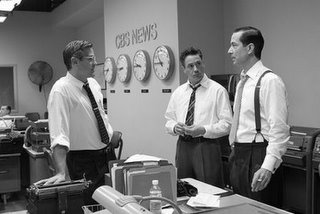Monday, November 07, 2005
Good Night, and Good Luck
 Though masterfully filmed and acted, George Clooney's second feature is thinly veiled hero worship that substantially manipulates historical facts in order to exalt the bravery and erudition of seminal CBS news personality Edward R. Murrow (David Strathairn).
Though masterfully filmed and acted, George Clooney's second feature is thinly veiled hero worship that substantially manipulates historical facts in order to exalt the bravery and erudition of seminal CBS news personality Edward R. Murrow (David Strathairn).The decision to use black and white photography in "Good Night, and Good Luck" is kind of a no brainer. Follow the logic: archived footage of Wisconsin senator Joe McCarthy was to recur onscreen. This footage is in black and white. Thus the options were to either a) colorize the footage, b) refilm the footage altogether in color and with an actor portraying McCarthy, or c) film the rest of the movie in black and white in order to correspond to the McCarthy footage (as well as that of the humorous commercials that occasionally appear in the film). Option B was most unviable, as it would have eroded the documentary aura engendered by the presence of the McCarthy footage. Option A was a similar, though less drastic step from the authenticity of the footage. Thus, in choosing Option C and using the unadulterated McCarthy footage, Clooney is bringing the audience directly into the milieu of McCarthy, Murrow, and the fearmongering political climate of America in the early 1950s.
The smokey interiors and lithe jazz interludes set the scene with style, even averting the pitfall of desperately screaming, "Hey look, we're in the '50s!" The smoke especially underscored the oppressive insularity of the newsroom, which more closely resembled a war room wherein deadlines, factuality and clean records carried life or death ramifications (literally in the case of redbaited CBS anchor Don Hollenbeck).
Despite Clooney's wise stylistic decision-making, his truthfulness is a bit dubious. Here it is worth noting the actor's long-standing beef with resident Fox News Channel bully Bill O'Reilly. The actor's father being a news anchor is also of note. Clooney has stated that he is simply a Murrow mark, but in "Good Night, and Good Luck," it is difficult to separate his journalistic idolatry from his political leanings. Does Clooney simply quarrel with O'Reilly and love Murrow because, having been raised by a news anchor to appreciate the craft, he knows good journalism when he sees it? Is it just a coincidence that McCarthy and O'Reilly are right-wingers?
My first major problem with the film is its ostensible suggestion that Joseph McCarthy's downfall was largely fomented by Murrow's episode of "See it Now" in which the renowned newsman challenged public acquiescence to the Wisconsin senator's bullying of the baselessly accused and violations of their Constitutional rights. In fact, McCarthy mostly self-destructed. 'Ol Tailgunner simply made one high-profile accusation too many until the Army said, "Okay asshole, you done fucked with the wrong guy!"
Secondly, the conflict between Murrow and McCarthy is simply too black and white. Especially in today's terrorist climate, it should be easy to understand the hysteria that fostered the red scare of which McCarthy was more a symptom than a cause. Murrow acknowledges this fact briefly in the movie, but otherwise, no context is given for McCarthy's motives. His actions are indeed inexcusable, and if he was purely hungry for publicity, then so too are his motives. However, with Alger Hiss, the Rosenbergs, and any untold number of Soviet spies at work at the time, Tailgunner's motives deserve more qualification than that given by Clooney.
Lastly, although Murrow was perhaps the most high-profile of McCarthy's critics, he was by no means either the first or the last. The senator had been up to his red-baiting tricks long before "See it Now" took to criticizing his cause. In this respect I felt the film overly exalted CBS' bravery. Notwithstanding substantial personal and financial risk, they were merely sounding their voice higher than that of the small chorus already challenging the Wisconsin senator's tactics.
The most laudable theme in "Good Night, and Good Luck" is that of journalistic politics. Murrow's boredom while talking to celebrities, as well as the bookend speech about the state of news in America, help to underscore what may be Clooney's most imperative point: good journalism suffers as commerce. When ratings and advertisers are factored into the equation, the courage and vision of men like Edward R. Murrow are rendered moot. The audience doesn't care about political bickering as much as they do about saccharine puff pieces that aggrandize their favorite celebrities. This unfortunate aphorism of journalism is one Clooney clearly laments, as do I.
David Strathairn, as Murrow, is a work of stone-faced brilliance. With little more than a steely glance and a deadpan delivery, he exerts a tight command on the audience's sense of urgency.
My biggest gripe about "Good Night, and Good Luck" came in the form of the Robert Downey Jr./Patricia Clarkson storyline (two married employees of CBS news forced to hide their union from co-workers due to anti-nepotism rules). The vitality of the film absolutely flatlines when their flaccid subplot takes the screen. Though adroit in their own rights, the two actors have minimal chemistry together. The subplot's relevance to the film's story is highly tenuous; the strands are tied together by the act of hiding information about yourself in order to avert discrimination or prejudice. Whoop-de-whoop. The scenes still belong on the proverbial cutting room floor.
Post a Comment
Wilcox vox. | Blogger Templates by Gecko &
Fly
No part of the content or the blog may be reproduced without permission.